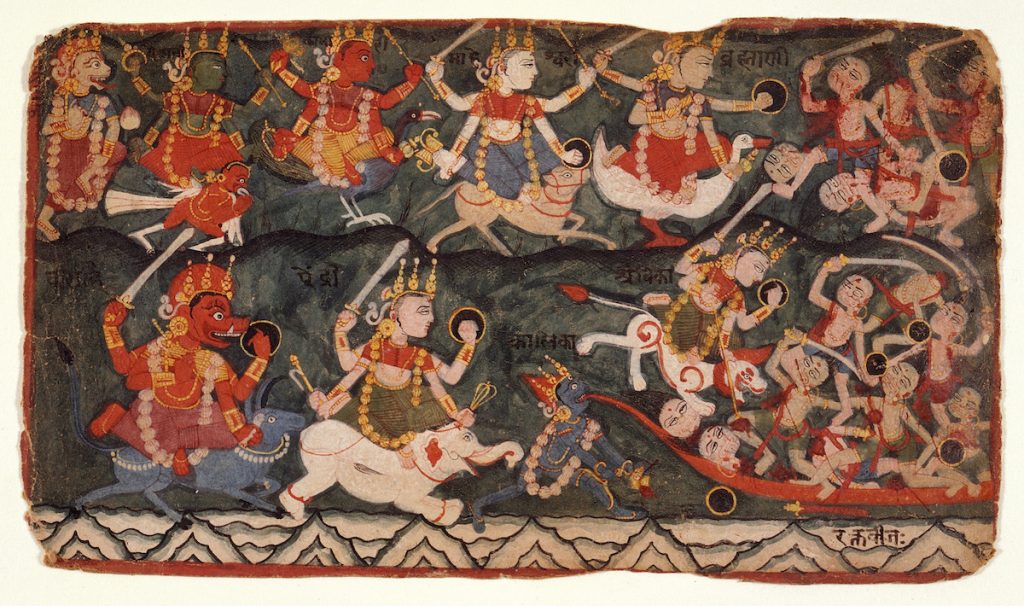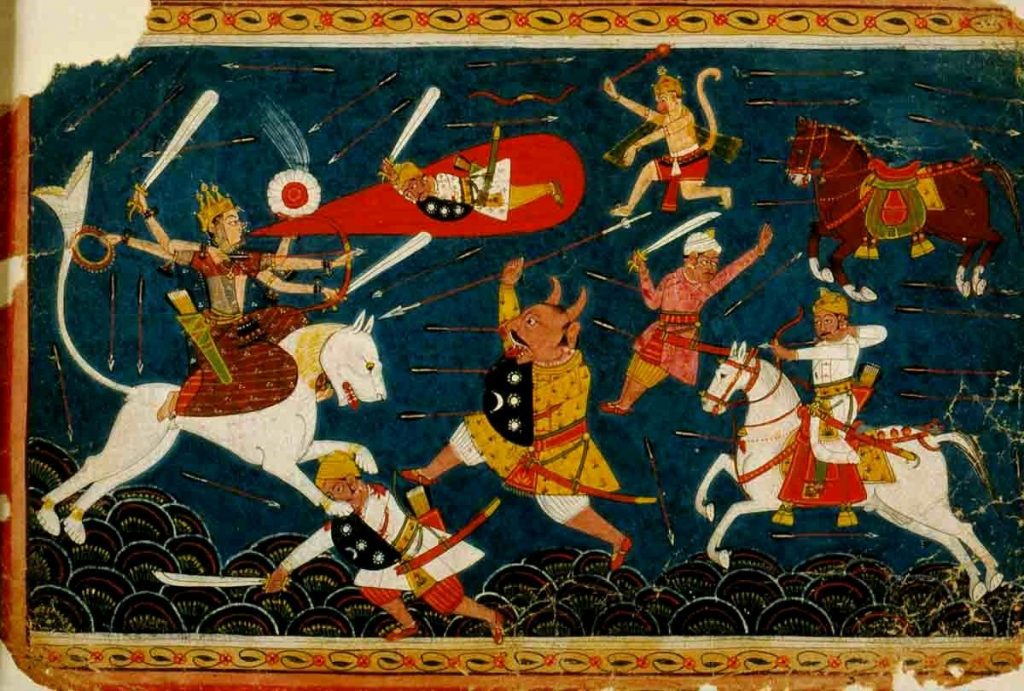As Navrātri draws to a close, one tries to reflect on the past nine days.
Vratā is tapas, a struggle to control and fight against your inner demons.
A way to reset, a way to start afresh.
The 10th day is a day of celebration.
A celebration of your victory over yourself.
For the battle was always fought within.
An external battle is easier, the enemy is known.
An internal battle however, needs introspection, acceptance of your shortcomings and a willingness to work on them.
That is the ultimate triumph.
And that, the 10th day, is your Vijayadashami.
See you tomorrow!
Read the previous part here…
Seeing Chanda and Munda vanquished, the remaining asura army panicked and fled in all directions. And Kāli, holding the heads of Chanda and Munda in her hands, approached Chandika and said, “In this sacrifice of battle, here I have brought you the heads of Chanda and Munda.”

The mighty Śumba burned with rage. Chanda and Munda were slain, and their armies annihilated. “Now, let the eighty-six Udayudhas with all their forces and weapons, and the eighty-four Kambus, along with their own forces, set out for battle. Let the fifty asura families of Kotiviryas and the hundred families of Dhaumras go forth at my command. Likewise let the asura clans, Kalakas, Daurhrdas, the Mauryas and the Kalakeyas hasten at my command and march forth ready for battle”. Śumba thus set out, commanding thousands of asuras, ready to slay anyone in his path.
Seeing this asura army approaching, Devi Ambika rang the mighty bell and it resounded all over the earth and the skies. Kālī roared and so did the lion of the Devi. The asura armies surrounded Devi Chandika and Kālī on all sides.
At that moment, to ensure the well being of the devas and to destroy their adversaries, the Śaktis sprang forth from the bodies of Brahma, Vishnu, Shiva, Skanda, and Indra.
In a heavenly chariot yoked by swans came Brahmani, carrying a japa-mala and a kamandalu. Maheshvari arrived mounted on a bull, holding the great trishul, with huge serpents for bangles, with the crescent moon as an ornament. Maa Kaumārī came in the form of Guha, riding on a fine peacock wielding the spear in her hand. Vaishnavi arrived seated on Garuda, holding a conch, club, bow and sword in hand. Varahi came to the battlefield, in the form of Hari as the sacrificial boar. Nārasirhhī too arrived in the form of Narasmiha, half-woman and half-lioness, scattering the constellations by the toss of her mane. The thousand-eyed Aindrī, holding a thunderbolt in hand and riding on the lord of elephants arrived just like Indra.
A pitched battle began. The asuras were no match for the śaktis, who slaughtered the demons by the thousands. Seeing them crushing the asura armies, the great asura Raktabīja came to the fore, in his huge chariot. This was no ordinary asura. Whenever a drop of his blood would spill on the ground, another asura as mighty as him would spring forth from the earth.
Raktabīja first attacked Aindrī, who struck him with her thunderbolt. As blood flowed from his wounds, thousands of Raktabījas sprung forth from the earth, each one as mighty as him. They fought by his side, with swords and spears, attacking the śaktis from all sides. Vaisnavi struck him with her discus, and Aindri hit the great asura with her mace. The field was soon filled with thousands of Raktabījas, born from the blood that flowed out of the cuts inflicted by Vaisnavi’s chakra. Kaumari struck him with her spear and Varahi with her sword. Maheshvari assaulted him with her trishul. And the enraged Raktabija fought back hard, not yielding an inch.

The devas were alarmed, seeing the seemingly unending numbers of Raktabījas filling up the field. Seeing them dejected this way, Chandika laughed and said to Kālī “O Chamunda, drink up all the blood that spills from Raktabīja as I strike him with my weapons.
Go around the battlefield and devour all the Raktabījas that are born from his blood. He will perish once he loses all his blood in this manner, and no more asuras will be born from his blood since you will drink it all.”
The Devi then struck Raktabīja with her spear, and the fierce Kālī drank up all his blood before it could spill to the ground. Raktabīja struck back, but failed to even touch the Devi. As she kept striking him with her spear, and her swords, Kālī kept drinking the blood that flowed from his wounds, not allowing even a single drop to spill to the ground. Raktabīja fought hard, but soon lost all his blood, and, after letting out a loud roar, fell to the ground, lifeless.
